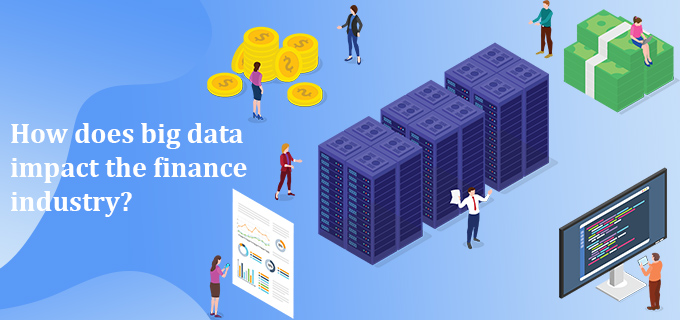How Does Big Data Impact the Finance Industry?

Table of Content:
- Introduction
- What is big data In finance?
2.1 Risk Modelling and Management
2.2 Consumer Analytics
2.3 Influence Strategy
2.4 Digital Transformation
2.5 Optimize Operational Efficiency
2.6 Completion Opportunities for the Industry
- Future Prospects of Big Data in Financial Services
- Wrap Up
Introduction
Now, names such as Data Analytics, Data Visualization, and Big Data have become pretty famous. These terms are balanced predominantly to topics concerning digital transformation and growth in companies.
In this digital era, every business world is managed by big data consulting. Data analytics are now extremely important whenever there is a decision-making process included.
Big data is one of the newest business and technical issues in this evolving digital era. And the financial software development industry is profoundly involved in big data events to resolve those technical issues as big data impacts the financial field the most.
As hundreds of millions of financial transactions happen to utilize various financial software solutions in the business world each day.
Through this data analytical tool, getting better insight has become much simpler now. It doesn’t change if your choice is going to leave an enormous or minimum impact; businesses have to guarantee they can obtain the right data to move ahead.
This procedure is required, particularly for the banking and finance division in the modern age.
Hence, financial experts and analysts regard it as an emerging problem of the data management and analytics of various financial products and services. Plus, big data has vital impacts on the finance industry, have a look at them!
2. What is big data In finance?
Big data in finance relates to the petabit of structured and unstructured data that can be utilized to expect customer behaviours and build plans for banks and financial companies.
The finance industry produces loads of data. Structured data is a report managed inside an organization to provide essential decision-making insights. Unstructured data exists in various sources in developing volumes and gives important analytical possibilities.
There are billions of money transferring across global markets every day, and analysts are accountable for observing this data with accuracy, security, and agility to build foresight, reveal patterns, and perform predictive strategies.
2.1 Risk Modelling and Management
Using Big Data analytics supports companies to create risk models and propose approaches to moderate them.
Confidence inside the data are possible chances that might raise the cost of doing business and financial institutions can uncover such risk management via analysis of market trends, social media sentiment analysis, and using patterns.
Also, banks can open and block deceitful pursuits applying machine learning algorithms that leverage huge amounts of data, which they now have. However, some models distinguish bad creditors, and such could be distinguished from their social media, so be careful.
2.2 Consumer Analytics
Consumer analytics involves the analysis of user patterns, investments, buying trends, personal opinions, and other credentials that are connected to their finances.
This benefits in targeting customers with valuable solutions and is a great lead generation plan.
Financial service providers (FSPs) can follow consumer action and always understand when they could trade them services. Big Data analytics reveals patterns like demographic patterns, forms of income level groups, and behavioral differences.
2.3 Influence Strategy
Big Data exceedingly affects company policy and procedure. This is an emerging course being encountered in the financial industry.
Leveraging the enhanced forecasting utilizing Big Data tools, companies can develop their predictions and combine them into the overall plan. In the last decade, companies depend on feeling and expertise to determine without leveraging any data.
2.4 Digital Transformation
Digital transformation is the biggest important change in the financial industry and is mainly powered by data. By opening new insights from analysis, businesses better know their products, practice patterns, and juggling links.
They can begin by connecting those links with innovative digital products or services to maintain their current customers. For example, machine learning algorithms can trace transactions and understand that customers are spending for a selective service utilizing their bank.
2.5 Optimize Operational Efficiency
Another major impact of Big Data on current finance is the development of operational efficiency.
For example, using Big Data, analysis of all agreement terms from the government for banks can be digitized and compared to all customers.
With that system, banks can have a more straightforward time listing compliance with the appropriate financial service companies. Big Data also increases overall performance in the industry by utilizing performance analytics to define optimal performance and build data-driven assessments.
2.6 Completion Opportunities for the Industry
Big Data is unfastening new possibilities by leveraging extensive financial data and applying advanced analytics.
Increased chances for growth can be known to start new products, trade insights to other companies, and enhance profits.
3. Future Prospects of Big Data in Financial Services
Artificial intelligence is growing speedily as an industry model and is revolutionizing the approach customers associate with FSPs.
As per the report of Accenture, 75% of banks consider that AI will be the foundation of a client’s commitment in the coming prospect.
It already converted several industries like transport via driverless cars, easy language processing, free mobility, machine-to-machine interaction, and so on.
All this will be impossible without extensive data utilized for learning processes.
Wrap Up
Now, as well all understand that Big Data is performing a major part in finance today. It is much more comfortable to derive customer sentiment from feedback on a huge range. It is also encouraging companies to recognize and learn key value drivers for more predictive analysis and customer satisfaction.
Though, the prospect of the financial services industry also relies on how well FSPs proceed to leverage Big Data in the future years.
Read more: c++ Library Management System

